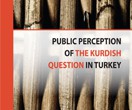SETA D.C. PANEL
Speakers:
Taha Özhan
(Moderator) Director-General of the SETA Foundation
Cengiz Çandar
Columnist, Radikal Newspaper
Prof. Bülent Aras
the SETA Foundation
Prof. Fuat Keyman
Koç University
Date: December 8, 2009 Monday
Venue: Grand Ballroom, Mayflower Hotel, Washington D.C.
Taha Ozhan, Director of the SETA Foundation introduced the panel and provided an ideological backdrop by discussing basic themes of contemporary Turkish foreign policy and the question over the change of direction, or an “axis” shift, a theme widely discussed within the Washington policy community, and the media, during Turkish Prime Minister Recep Tayyip Erdogan and Foreign Minister Ahmet Davutoglu’s meetings with the Obama administration on December 7, 2009.
Cengiz Candar, Radikal columnist, spoke first, outlining the main points of his recently published SETA policy brief, entitled: “Turkey’s ‘Soft Power’ strategy: A New Vision for a Multipolar World”. Candar emphasized the debate over whether Turkey is undergoing an axis shift, or shying away from the Transatlantic system. He argued that despite the statements of Turkey’s policymakers, which defend the notion that such a foreign policy orientation shift of axis doesn’t exist, the debates over Turkish identity, within Turkish society, as well as perception from the larger international community, has seemingly built momentum. In line with the AK Party’s policies, Candar concluded that the shift should not be attributed to Turkey’s departure from its Western ties to be replaced by those with the East but rather recognition that the Cold War has ended, and the new faces of the global order should be considered. Prof. Bulent Aras of SETA Foundation highlighted main points of his SETA policy brief, entitled “Davutoglu Era in Turkish Foreign Policy.” He dealt with the new dynamic and multidimensional foreign policy vision of Turkish foreign policy, emphasized that such vision is visible on the ground, most notably to date’s numerous and significant efforts to address chronic problems in the neighboring regions. Prof. Aras suggested that the Davutoğlu era in Turkish foreign policy will deepen Turkey’s involvement in regional politics, international organizations, and world politics. Fuat Keyman, whose work also appeared recently in a SETA Policy Brief entitled: “Turkish Foreign Policy in the Era of Global Turmoil”, added some depth of explanation over elements of ambiguity within the new Turkish foreign policy orientation. Keyman’s analysis pointed to Turkey’s pro-active and multi-dimensional diplomatic activism, and said that this proactivity has led to ambiguities in relevance to the aim, intention of recent Turkish foreign policy. Ambiguities have also meant an increased skepticism in certain parts of the western audience about the direction of Turkey, he went onto suggest. Keyman noted, however, that Turkey’s new foreign policy identity has been beset by skepticism, contradictions, and even tensions. The second element of skepticism is that Turkey has initiated such multidimensional foreign policy behavior as a “decentralized and independent proactivism without a firm western anchor- which has been potrayed as Neo-Ottomanism. Keyman’s third form of skepticism, dealt with the difficulties lying ahead; and Turkey finding itself in a juggling act. It raises the question of such factors as realism and sustainability. In other words, how sustainable is Turkey’s massive juggling act? Keyman’s analysis and study suggested that the sustainability of this multi-dimensional and constructive foreign policy activism requires Turkey to have European Union anchor as the main axis of its foreign policy and a consolidated democracy.
In this article
- Domestic Policy
- 2009
- Changing
- Cold War
- Direction
- Discussing
- Economic and Social Research
- Europe
- European Union (EU)
- Foreign Minister
- Policy
- Prime Minister
- Recep Tayyip Erdoğan
- SETA
- The President of the Republic of Türkiye
- Turkish
- Turkish Foreign Policy
- Turkish President
- Türkiye's Foreign Policy
- Türkiye's Justice and Development Party | AK Party (AK Parti)
- Western World
